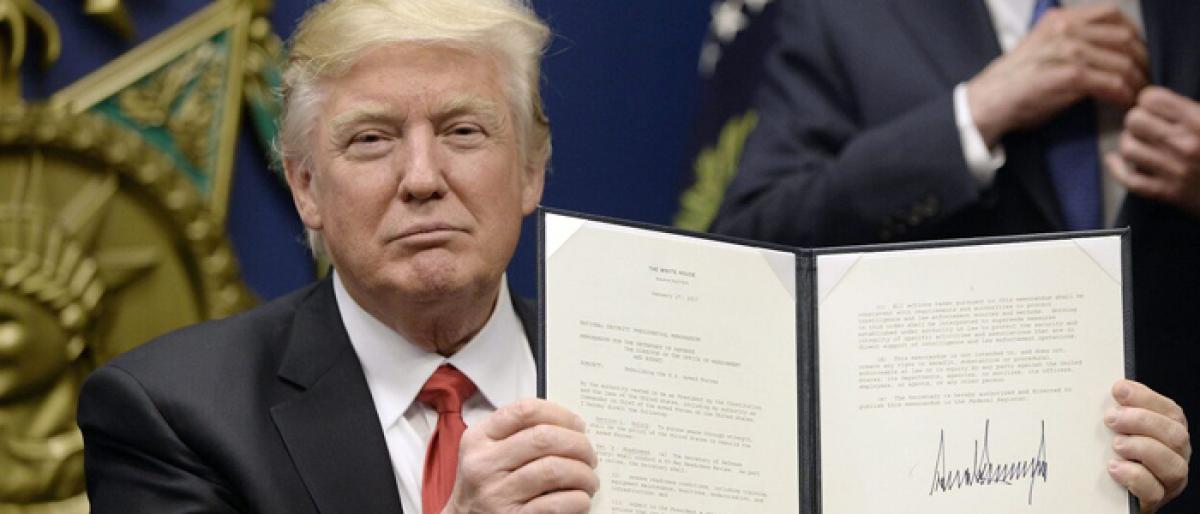Live
- 35 miners trapped under rubble in Afghanistan
- Lavanya Tripathi's Birthday Gift: Title Announcement of Her New Film ‘Sathi Leelavathi’
- Kerala Hindu leader gifts Rig Veda to Pope Francis
- OakTree School Celebrates Eight Years of Success, Announces Future Expansion
- Why plant-based milks may not be healthy
- Jharkhand: Ayushman Bharat cards in demand, Sahebganj residents rush to the centre
- Supreme Court likely to pass directions on implementation of policy to curb air pollution in Delhi-NCR tomorrow
- The first day of Group-2 Paper 1, 2 exams in Wanaparthy district ended peacefully, said Additional Collector Revenue G. Venkateswarlu
- VP Dhankhar urges corporates to invest in education
- Punjab DGP, MHA official request farmer leader Dallewal to end 20-day fast
Just In

The US Supreme Court has allowed the Trump administration to fully enforce a ban on travel to the US by residents of eight countries, including six Muslim-majority countries, while legal challenges will proceed in lower courts. Issued in September, the third version of the travel ban placed varying levels of restrictions on nationals from Chad, Iran, Libya, North Korea, Syria, Venezuela, Somalia a
Washington: The US Supreme Court has allowed the Trump administration to fully enforce a ban on travel to the US by residents of eight countries, including six Muslim-majority countries, while legal challenges will proceed in lower courts. Issued in September, the third version of the travel ban placed varying levels of restrictions on nationals from Chad, Iran, Libya, North Korea, Syria, Venezuela, Somalia and Yemen.
In unsigned orders on Monday that did not disclose the Supreme Court's reasoning, the justices lifted the injunctions which had been issued by federal judges in Hawaii and Maryland, the New York Times reported. The decision, supported by seven of the nine justices, was a major victory for US President Donald Trump after his two previous versions of the travel ban were blocked or narrowed in lower courts earlier this year.
Under the executive action, an exception would be made for travelers with "bona fide" links inside the US such as documented business purposes or close family relationships. The ruling did not mean that the apex court accepted the ban as constitutional but that it found persuasive the Trump administration's argument that an emergency injunction against the ban was unnecessary.
The High Court is expected to weigh the ban on its merits -- and to rule whether it violates constitutional protections against discrimination -- in the coming months. The restrictions vary in their details but in most cases citizens of the countries will be unable to emigrate to the US permanently and many will be barred from working, studying or vacationing here. Iran, for example, will still be able to send its citizens on student exchanges though such visitors will be subject to enhanced screening. Somalis will no longer be allowed to emigrate to the US but may visit with extra screening.
The Supreme Court's orders effectively overturned a compromise in place since June when it said that travelers with connections to the US could continue to travel here notwithstanding restrictions in an earlier version of the ban. Attorney General Jeff Sessions hailed the ruling as "a substantial victory for the safety and security of the American people", despite the advice of terrorism scholars who say that security justifications for the ban were misleading.
A spokesman for the White House, Hogan Gidley, said: "We are not surprised by today's Supreme Court decision." He called it "lawful and essential to protecting our homeland". The Trump administration has denied that the ban is discriminatory along religious lines. The President's first ban, issued in January, was chaotically rolled out and quickly blocked by a series of lower court rulings.
The second attempt, a more streamlined version of the first, was also blocked by the lower courts but eventually allowed to come into effect in a limited form. Lawyers challenging the administration's successive travel bans have argued that each iteration of the restrictions suffered from the same discriminatory intent, evolving from Trump's pledge as a Presidential candidate to enforce a "total and complete shutdown" of Muslims entering the US.
The San Francisco-based ninth US circuit court of appeals and the fourth US circuit court of appeals in Richmond, Virginia, will be holding arguments on the legality of the ban this week. Following the Supreme Court ruling, lawyers involved in the current challenges to Trump's ban vowed to continue fighting.

© 2024 Hyderabad Media House Limited/The Hans India. All rights reserved. Powered by hocalwire.com







